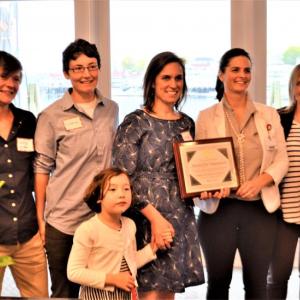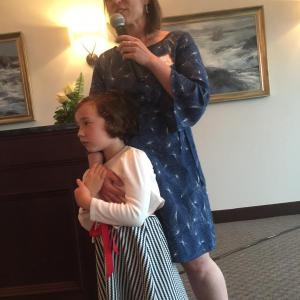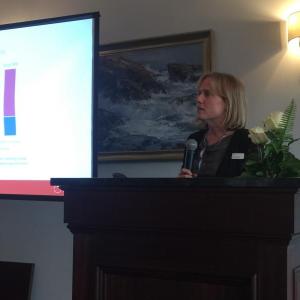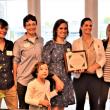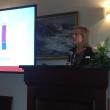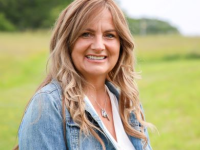Twin Villages Food Bank Farm wins second annual Innovation Award
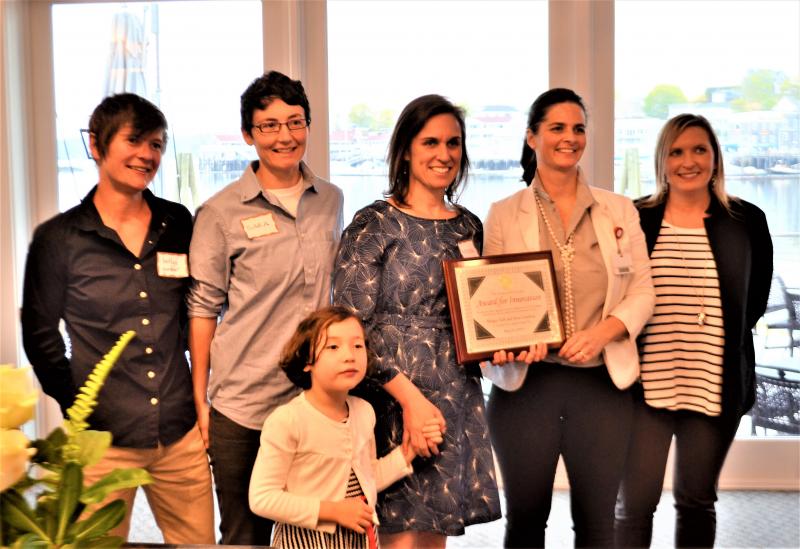 From left, Kaitlyn Gardner, Sara Cawthorn, Adley Cawthorn, Megan Taft, Anni Pat McKenney and Casey Clark Kelley. JOSEPH CHARPENTIER/Boothbay Register
From left, Kaitlyn Gardner, Sara Cawthorn, Adley Cawthorn, Megan Taft, Anni Pat McKenney and Casey Clark Kelley. JOSEPH CHARPENTIER/Boothbay Register
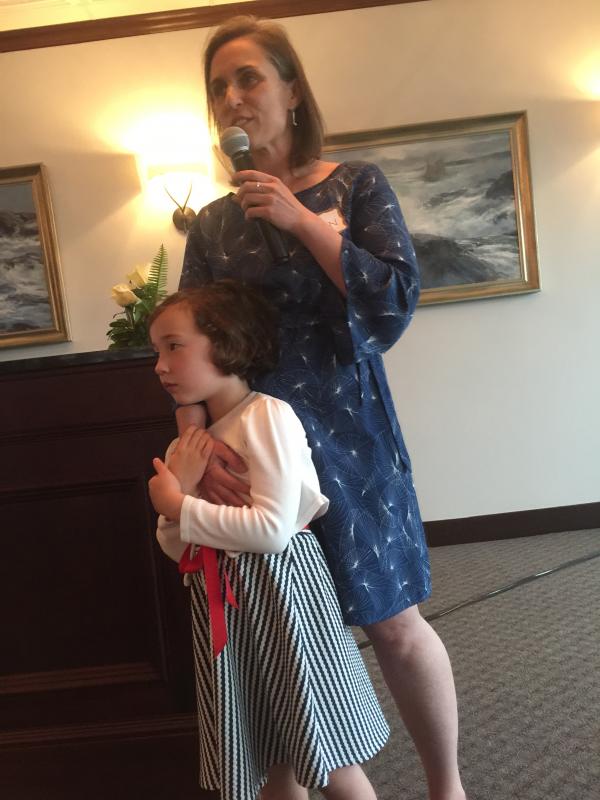 Taft accepts the Innovation Award with Adley. JOSEPH CHARPENTIER/Boothbay Register
Taft accepts the Innovation Award with Adley. JOSEPH CHARPENTIER/Boothbay Register
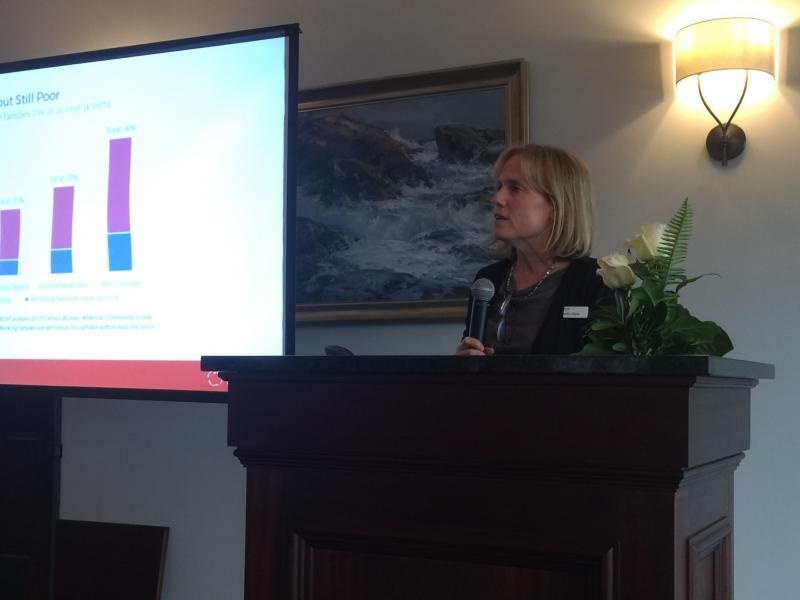 Keynote speaker Kristen Miale, president of the Good Shepher Food-Bank, speaks about food insecurity. JOSEPH CHARPENTIER/Boothbay Register
Keynote speaker Kristen Miale, president of the Good Shepher Food-Bank, speaks about food insecurity. JOSEPH CHARPENTIER/Boothbay Register
 Adley peeks over the podium as Taft speaks to the audience. JOSEPH CHARPENTIER/Boothbay Register
Adley peeks over the podium as Taft speaks to the audience. JOSEPH CHARPENTIER/Boothbay Register
 From left, Kaitlyn Gardner, Sara Cawthorn, Adley Cawthorn, Megan Taft, Anni Pat McKenney and Casey Clark Kelley. JOSEPH CHARPENTIER/Boothbay Register
From left, Kaitlyn Gardner, Sara Cawthorn, Adley Cawthorn, Megan Taft, Anni Pat McKenney and Casey Clark Kelley. JOSEPH CHARPENTIER/Boothbay Register
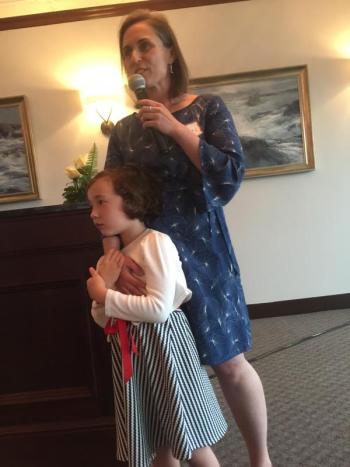 Taft accepts the Innovation Award with Adley. JOSEPH CHARPENTIER/Boothbay Register
Taft accepts the Innovation Award with Adley. JOSEPH CHARPENTIER/Boothbay Register
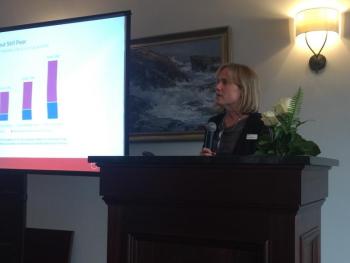 Keynote speaker Kristen Miale, president of the Good Shepher Food-Bank, speaks about food insecurity. JOSEPH CHARPENTIER/Boothbay Register
Keynote speaker Kristen Miale, president of the Good Shepher Food-Bank, speaks about food insecurity. JOSEPH CHARPENTIER/Boothbay Register
 Adley peeks over the podium as Taft speaks to the audience. JOSEPH CHARPENTIER/Boothbay Register
Adley peeks over the podium as Taft speaks to the audience. JOSEPH CHARPENTIER/Boothbay Register
Twin Villages Food Bank Farm co-founders Megan Taft and Sara Cawthon won the second annual Innovation Award presented by the Coulombe Center for Health Improvement. The recipients were awarded at the Boothbay Harbor Oceanside Golf Resort and received $3,000 to continue their efforts to combat food insecurity in the Lincoln County area.
CCHI Program Manager Anni Pat McKenney presented the award. She explained it illustrates the type of work CCHI holds in high regard. McKenney said CCHI was pleased to have five nominations in the past year. LincolnHealth's Kelly Creamer, Jim Stevens, Christine Henson and Cathy Cole were on the selection committee which also had community members Haley Bezon, last year’s recipient, and Holly Stover. Other nominations included Nancy Van Dyke of Food for Thought, Eric Duffy of Lincoln Academy, Meagan Hamblett of CLC YMCA, and Charlie Richardson of Kieve Wavus.
McKenney said TVFBF impressed the selection committee with its wide impact to Lincoln County and for supporting the county’s youngest to its eldest. The committee also noted TVFBF partners with several of the other nominees, said McKenney.
CLC YMCA's Director of Operations Casey Clark Kelley nominated TVFBF. “They are a partner who encourages synergy of collaboration working alongside others instead of in their own silos,” wrote Kelley in her letter of support.
Also providing letters of support were Gretchen Burleigh-Johnson, a Wiscasset-based food pantry director, and the evening’s keynote speaker, Kristin Miale, President of Good Shepherd Food-Bank.
Taft spoke on behalf of TVFBF with her and her partner Cawthon’s daughter Adley who could barely peek above the podium. Taft said she did not want to sound cliché should she win the award, so she decided she would share a piece of wisdom Adley has held onto over the past year:
“Adley has taught us that life is about filling your bucket and finding those moments of joy and happiness. This is one of them.”
Adley’s lesson came from her school's guidance counselor: Haley Bezon, last year's Innovation Award recipient for her work with Hearty Roots. “It all comes full circle,” said Taft.
Four years ago when TVFBF was barely an idea, its co-founders struggled with how to best bring their passion for agriculture to the community in a helpful way. With Taft's background in food access and food justice and Cawthon's background from five generations of Midwest corn and soybean farming, they figured the two experiences would have to mesh somewhere.
They spoke with Damariscotta River Association's Stephen Hufnagel about their thoughts and a short walk through the Round Top property later, they understood Hufnagel was all about shepherding a vision of a land trust with community at its center.
“Growing food for our community was just a no-brainer,” Taft said.
In TVFBF's first season in 2016, it grew and distributed 20,000 pounds of food. This past year, the figure was 40,000 pounds and next year is projected at 50,000 pounds – all done on two acres of land by two people: Cawthon and assistant farm manager Kaitlyn Gardner, now an extension of their family, said Taft.
Keynote speaker Kristen Miale spoke about food insecurity in Maine, how it affects us all and what we can do to help diminish it.
“The work of ending hunger is actually a powerful preventative healthcare tool for our most vulnerable populations, because a vision that we all share is that we want all Mainers to be able to live their best lives and people cannot do that if they're hungry or in poor health,” said Miale.
Miale said food insecurity is the struggle of limited access to food and the cycle of stress and health problems that creates. GSFB tries to end it with its network of community partners, Miale said. This network includes 400 hunger relief partners, 150 schools, 16 after school programs, 70 healthcare organizations and 75 farms. In all, GSFB partners provide 25 million meals per year to over 175,000 Mainers.
“Nourish, connect and empower” is GSFB’s goal, Miale said. By 2025, GSFB hopes to provide access to nutritious food to every food-insecure Mainer. Through its Cooking Matters program, which provides nutrition and cooking classes, and the Community Health and Hunger program, which assists healthcare providers by providing screening tools and emergency food bags, GSFB also hopes to increase its partnerships.
Said Miale, “People who have become accustomed to always having to rely on someone else's castoffs to survive, they live on secondhand clothing, secondhand furniture, secondhand food, and when that is your experience you start to internalize that message and start to convince yourself that's all you deserve. I have been blown away by seeing the power that fresh healthy food that has been grown just for somebody, sends the message that you matter. And to me, we are starting to punch back on that stress … (for) people who are just trapped in the vicious cycle of poverty.”
A culmination of efforts and support have brought Taft and Cawthon to the Innovation Award, Taft said in a followup interview.
“It's what we've been aiming for from the beginning that this is really a community effort and to be here tonight and to be a part of that really felt like 'This is it! We did it!'”
Event Date
Address
United States

